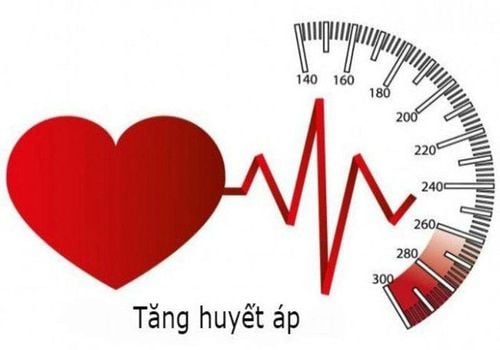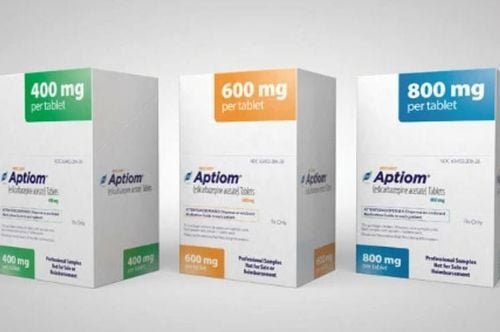This is an automatically translated article.
Adderall helps to increase attention, focus on activities and control behavior problems. It is used to treat attention deficit hyperactivity disorder and narcolepsy, a sleep disorder.
1. Uses and indications of the drug Adderall
Adderall is used to treat attention deficit hyperactivity disorder - ADHD. It works by changing the amount of certain natural substances in the brain. Adderall (Amphetamine/Dextroamphetamine) belongs to the group of stimulants. It can help you increase your ability to pay attention, focus on an activity, and manage behavioral problems. It can also help you stay organized and improve your listening skills. Adderall is also used to treat a sleep disorder called narcolepsy, to keep you awake during the day. This medicine should not be used to treat fatigue or trouble sleeping in people who do not have a sleep disorder.
2. How to use Adderall
You need to read the medication instructions provided by your doctor carefully before you start taking amphetamine/dextroamphetamine. If you have any questions, ask your doctor when prescribed.
Adderall is taken orally on an empty stomach or on an empty stomach, usually 1-3 times a day. The first dose is usually taken when you wake up in the morning. If you are prescribed more doses, take them as directed by your doctor, usually 4-6 hours apart. Taking this medicine late in the day may cause trouble sleeping, even insomnia.
Dosage is calculated by your doctor based on your medical condition and response to treatment. Your doctor can adjust your dose to find the dose that works best for you. So you follow your doctor's instructions carefully.
To achieve the best effect, you should use Adderall medicine regularly. To avoid forgetting to take your medication, take it at the same time each day.
During treatment, your doctor may advise you to stop the medication for a short time from time to time to see if there are any changes in your behavior and if the medication is still needed .
If you suddenly stop using Adderall, you may have withdrawal symptoms, such as severe fatigue, trouble sleeping, mood swings such as depression. To help prevent withdrawal symptoms, your doctor may reduce your dose slowly. This may happen if you have been using this medicine for a long time or in high doses.
Although it works for many people, it can sometimes be addictive for some people. This risk may be higher if you have a substance use disorder such as drug or alcohol abuse or addiction. You absolutely must not increase the dose, increase the number of times of use or use it for a longer time than prescribed by your doctor. And when stopping the drug, it is necessary to follow the doctor's instructions, absolutely do not stop the drug suddenly.
When Adderall is used for a long time, it may not work. At that time, you need to talk to your doctor so that you can change the dose or change to another medicine. Tell your doctor if your condition does not improve or worsens.

Thuốc Adderall được sử dụng để điều trị chứng rối loạn tăng động giảm chú ý - ADHD
3. Possible side effects when using Adderall
If any of the side effects below persist or get worse, tell your doctor right away. Includes:
Loss of appetite Weight loss Dry mouth Discomfort Stomach pain Nausea or vomiting Dizziness Headache Diarrhea Fever Stress Difficulty sleeping Remember that your doctor has prescribed this medicine because they have assessed that beneficial The benefit that the drug gives you outweighs the risk of side effects. Many people use this medication without experiencing any serious side effects.
Adderall may increase your blood pressure. Therefore, while taking this medicine, you need to check your blood pressure regularly and let your doctor know if your blood pressure is higher than normal.
Tell your doctor right away if you have any serious side effects, including:
Signs of blood flow problems in your fingers or toes such as cold, numbness, pain or change in skin color; Unusual wounds on fingers or toes; Mental problems or changes in mood or behavior such as: agitation, aggression, mood swings, depression, unusual thoughts, suicidal thoughts; Uncontrollable movements, constant chewing or grinding of teeth; Making unusual words or sounds; Changes in sexual ability or desire, frequent or prolonged erections in men. You need medical help right away if you have any of the following very serious side effects, including:
Shortness of breath Pain in your chest, jaw or left arm Fainting Severe headache Fast or pounding heartbeat strong, or irregular beating Convulsions Swelling of ankles or whole feet Extreme fatigue Blurred vision Weakness on one side of the body Difficulty speaking Confusion
Adderall can increase serotonin, but it rarely causes a very serious condition called serotonin toxic syndrome. Your risk of developing this syndrome is increased if you are also taking other medicines that increase serotonin, so tell your doctor or pharmacist of all the medicines you take. Get medical help right away if you have any of the following symptoms:
Fast heartbeat Hallucinations Loss of coordination Severe dizziness Nausea or vomiting Severe diarrhea Muscle twitching Fever of unknown cause Agitation Unusual restlessness Very rarely a very serious allergic reaction has occurred with the use of Adderall. However, get medical help right away if you notice any of the following symptoms of a serious allergic drug reaction: rash, itching, or swelling, especially of the face, tongue or throat. , severe dizziness, trouble breathing.
If you notice other side effects not listed above, contact your doctor for timely treatment.

Thuốc Adderall có thể làm tăng huyết áp của bạn
4. Precautions when using Adderall
The first measure to prevent unwanted effects when using Adderall is to tell your doctor if you are allergic to it; or with other sympathomimetic drugs (such as lisdexamfetamine); or if you have any other allergies. Medicines may contain extra ingredients that can cause allergic reactions or other problems.
Before using this medicine, give your doctor the best of your medical history, especially of:
Blood circulation problems: such as Raynaud's disease Certain mental or mood conditions such as severe agitation, psychosis Personal or family history of mental disorders such as bipolar disorder, depression, psychosis, suicidal thoughts Heart problems including heart rhythm irregularities, coronary artery disease, heart failure, cardiomyopathy, structural problems such as heart valve problems. Family history of heart problems such as sudden death, heart rhythm problems History of stroke, high blood pressure, hyperthyroidism Certain eye problems such as glaucoma Epilepsy Personal or family history Family history of stimulant use disorders such as drug or alcohol abuse or addiction Personal or family history of uncontrolled muscle movements such as Tourette syndrome Kidney disease Liver disease Adderall can make you rapidly face and alcohol or marijuana can make you more dizzy. That's why you shouldn't drive, use machines, or do anything that requires alertness until you can do it safely. At the same time, it is necessary to limit alcoholic beverages while using the drug. Talk to your doctor if you are using drugs.
Children may be more sensitive to the side effects of Adderall, especially weight loss. This medicine may slow a child's growth. Your doctor may suggest temporarily stopping the medication over time to reduce this risk. At the same time you should monitor the weight and height of the child.
Older adults may be more sensitive to the side effects of this medicine, especially chest pain, trouble sleeping, or weight loss.
During pregnancy, Adderall should only be used when absolutely necessary. Talk to your doctor about the risks and benefits of taking the drug while you're pregnant. Infants born to mothers who are dependent on this drug may be born prematurely and with low birth weight. These children may also have withdrawal symptoms. Notify your doctor immediately if you notice unusual mood swings, agitation or fatigue in your newborn.
Adderall can pass into breast milk, so it may have undesirable effects on the nursing infant of a mother taking the medicine. Therefore, breast-feeding while using this medicine is not recommended. You need to consult your doctor before breastfeeding.
5. Adderall drug interactions
Drug interactions can change the way a drug works or increase the risk of serious side effects. That's why you need to keep a list of all the products you use including prescription drugs, over-the-counter medicines and herbal products and share it with your doctor. Never start, stop, or change the dose of a medication without your doctor's approval.
Using MAO inhibitors together with this medicine can cause serious drug interactions, which can even be fatal. Therefore, you should avoid taking an MAO inhibitor (linezolid, isocarboxazid, methylene blue, moclobemide, procarbazine, phenelzine, rasagiline, safinamide, selegiline, tranylcypromine) during treatment with this medicine. Most MAO inhibitors also should not be taken for two weeks prior to treatment with this medicine. Ask your doctor when to start or stop taking this medicine.
Some products contain ingredients that may increase your heart rate or blood pressure. Tell your doctor what products you are using and ask how to use them safely, especially cough and cold products or diet aids.
The risk of serotonin syndrome increases if you are also taking other medications that increase serotonin. Like street drugs like MDMA/"ecstasy", some antidepressants include SSRIs like fluoxetine/paroxetine, SNRIs like duloxetine/venlafaxine. Your risk of serotonin syndrome may be higher when you start or increase your dose of these drugs.
Dextroamphetamine is very similar to lisdexamfetamine, so do not use drugs containing lisdexamfetamine while using dextroamphetamine.
This medicine may change the results of certain medical tests including blood and urine steroid levels, brain scans for Parkinson's disease, possibly causing false test results. That is why it is important to make sure that laboratory staff and all your doctors know you are using this medicine.
6. What to do when using an overdose of Adderall?
If you find someone has overdosed and has serious symptoms such as fainting or difficulty breathing, call 911. Or take the patient to the nearest medical facility for timely treatment.
Symptoms of an Adderall overdose may include: severe mood swings, seizures, severe or persistent headache, severe restlessness, rapid breathing.

Các triệu chứng khi sử dụng thuốc Adderall quá liều có thể co giật, đau đầu dữ dội hoặc dai dẳng
7. What to do when forgetting to take Adderall pills?
If you miss a dose, take it as soon as you remember in the morning. If it is found late, in the afternoon or near the time of your next dose, skip the missed dose and take your next dose at the usual time. Never double the dose to make up for the missed dose.
8. How to store Adderall? Store Adderall at room temperature, away from light and moisture. Do not leave medicine in the bathroom. Keep medicine away from children and pets.
Please dial HOTLINE for more information or register for an appointment HERE. Download MyVinmec app to make appointments faster and to manage your bookings easily.
Reference source: webmd.com












